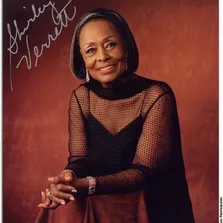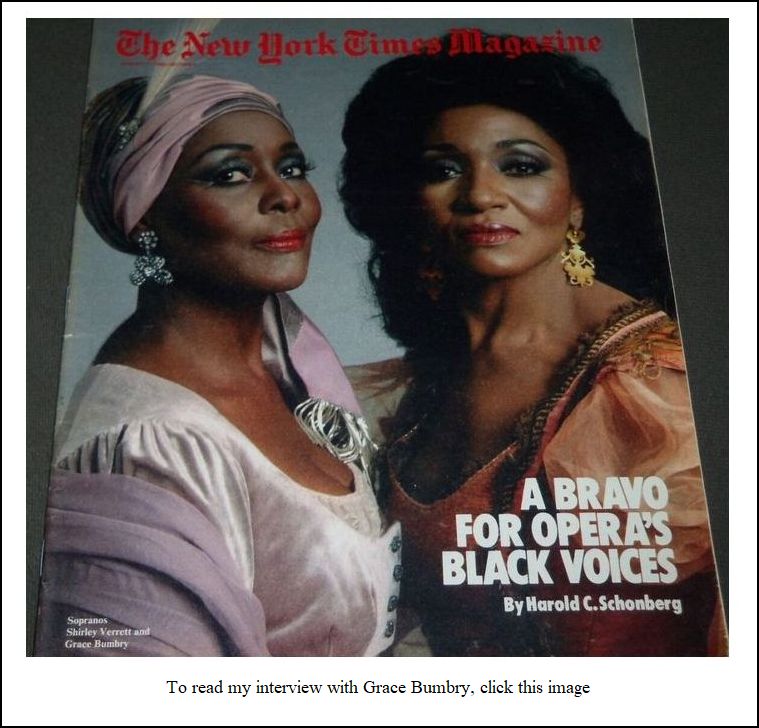Born: May 31, 1931 (New Orleans, LA)
Died: November 5, 2010 (Ann Arbor, MI)
Shirley Verrett, mezzo-soprano, was an internationally renowned opera singer and concert recitalist. Her performances and recordings marked her as one the leading singers in the post-Marian Anderson generation of African American classical musicians.
Verrett was born into an African-American family of devout Seventh-Day Adventists and was raised in Los Angeles. She showed musical talent at an early age and sang in the church choir. She went on to study with Anna Fitziu and Marion Feschl at the Juilliard School.
In 1958, she was named a winner in the Walter W. Naumburg Competition, and in 1961, she won the Metropolitan Opera National Council Auditions.
In 1957, she made her operatic debut in Britten's The Rape of Lucretia under her then married name of Shirley Carter. As Shirley Verrett, in 1958, she made her New York City Opera debut as Irina in Weill's Lost in the Stars, and a year later, made her European debut in Cologne, Germany in Nicolas Nabokov's Rasputins Tod.
Verrett appeared in the first concert ever televised from Lincoln Center in 1962, and appeared that same year on television in Leonard Bernstein's first Young Peoples Concert.
She made her Metropolitan debut in 1968 singing Carmen, and at La Scala in 1969, in Samson and Dalila. Verret performed with Leopold Stokowski leading the Philadelphia Orchestra in an engagement that catapulted her onto a national stage. That year she debuted as Carmen with the Bolshoi Opera (the first African American singer to perform with the company) and also sang several recitals throughout the Soviet Union.
In 1964, Verrett signed an exclusive contract with RCA and records several operas and concerts for the label. Between 1966 and 1968, Verrett sang the mezzo leads in several Europe opera houses including Covent Garden (Un Ballo in Maschera, Aïda, and Don Carlo), and the Teatro Comunale in Florence (Maria Stuarda). Verrett made her Metropolitan Opera debut in October 1968 singing the lead in Carmen and Eboli in Don Carlo. She was also named “Musician of the Month” by Musical America. Verrett added to her operatic repertory over the next few years both in Europe as well as in the United States including the roles of Didon in Les Troyens (Rome); Amneris and Leonora in Aïda and La Favorita (in Dallas); Dalila in Samson et Dalila (La Scala) and as Azucena in Il Trovatore (Covent Garden).
During the 1970s, Verrett reached the pinnacle of her career and was generally recognized as one of the concert world’s leading artist. She returned to the Met and made operatic history by singing both Cassandra and Didon in Berlioz’s Les Troyens in a single performance. This feat elevated her career and stature even more internationally.
In 1974 Verrett scored another major triumph at the Met when she sang Neocle opposite Beverly Sills (in her Met debut) in L’Assedio di Corinto. The following year she scored yet another major success at La Scala Opera House by singing Lady Macbeth (which was televised throughout Europe) and came to define that role for future sopranos. Verrett returned to the Met in Spring 1976 to sing Adalgisa in Bellini’s Norma, but took over the title role during the Met tour. This became another signature role and her favorite operatic heroine. Verrett continued to perform celebrated roles like Azucena, but added other soprano roles to her repertory including Madame Lidoine in The Dialogue of the Carmelites, Amelia in Un Ballo in Maschera and the title role in Puccini’s Tosca.
Verrett debuted with the Chicago Opera as Azucena in 1987. She appeared as Norma with the Monte Carlo Opera at the beginning of 1988. By the 1990s Verrett was slowing down as an active opera singer, but added another opera role to her extensive repertory. Santuzza in Mascagni’s Cavalleria Rusticana was staged for her in Sienna. Verrett also made her big screen debut in a speaking role in the film Maggio Musicale which was released in Europe. She made her final operatic appearance in 1992 as Leonora in La Favorita in Seville and Madrid, but continued as an active recitalist.
During the 1994-95 season Verrett sang Nettie Fowler in a Broadway production of Rodgers and Hammerstein’s Carousel which garnered her more critical acclaim. During her Broadway run, Verrett met and sang for Bishop Desmond Tutu who thanked her for not performing in apartheid South Africa, although she had received several lucrative offers to perform there.
In 1996, Verrett accepted a professorship at the University of Michigan and eventually was endowed as the James Earl Jones Distinguished Professor of Voice.
In 1999 her singing voice appeared on the sound track of the Academy Award winning Italian movie, La Vita e Bella. The same year Verrett returned to New York to perform the lead in an off-Broadway production of Will Marion Cook’s musical In Dahomey.
She was the recipient of many awards for her recordings and has been honored by the receipt of many honorary doctorates including those from Northeastern University, Holy Cross College and Virginia Commonwealth University.
Her autobiography, I Never Walked Alone: The Autobiography of an American Singer, published by John Wiley and Sons was released in 2003. In the book, she recounted that "in 1959, Leopold Stokowski hired her to sing the Wood Dove in a performance of Schoenberg's "Gurrelieder" with the Houston Symphony, but the orchestra's board would not allow a black soloist to appear. To make amends, a shaken Stokowski took Ms. Verrett to the Philadelphia Orchestra for a performance of Falla's "Amor Brujo" which led to a fine recording."


1958 Naumburg Competition
First Prize